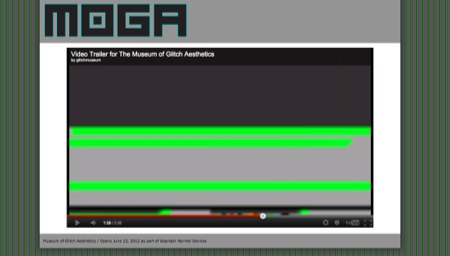Museum of Glitch Aesthetics
Stacey Mason

Mark Amerika tweets an interesting trailer for the Museum of Glitch Aesthetics. I was expecting a portfolio of interesting glitch work, but apparently the site is actually a commissioned work itself, a piece in Amerika's series of transmedia narratives that aims to tell the story of a glitch artist. From the Abandon Normal Devices page:
The Museum of Glitch Aesthetics (MOGA) is the latest work in Mark Amerika's collaborative series of transmedia narratives. MOGA tells the story of The Artist 2.0, an online persona whose personal mythology and body of digital artworks are rapidly being canonised into the annals of art history. The piece traces the life of the artist and his ongoing commitment to a practice of ‘glitch aesthetics’ that leads to the museum of the title. MOGA will feature a wide array of artworks intentionally corrupted by technological processes including net art, digital video art, digitally manipulated still images, game design, stand-up comedy, sound art, and electronic literature. The project will also include a mock museum catalog available in both free e-book and print-on-demand editions.
Glitch deals largely with remix aesthetics, but there's more going on here. Much of JODI seems to deal with anxiety over uncontrollable technology but there is the issue of textuality in code and the conspicuousness of the machine at work. Similarly, generative poetry like John Cayley's or Nick Montfort's work embraces detachment of signifier and highlights the bold line between where the human ends and the machine begins in a way that explores the complexities of human-machine interaction.
Glitches highlight the break in the cyborg mentality, relying on the push and pull of anxiety, departure from the human, and the confrontation of the uncanny. Perhaps this is why so much pleasure is gained through knowledge of the source material and understanding just how it has been changed or corrupted. Perhaps we are quantifying change in a way that will make the remixers and gamers--both fetishizers of power and agency--comfortable in the knowledge that the line between human and machine is clear and controllable.
